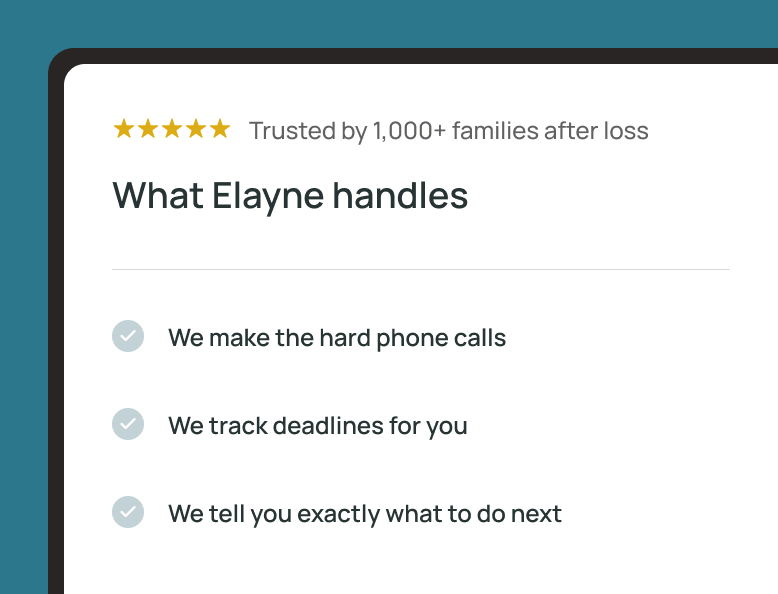Key Takeaways
- Notifying Experian and other credit bureaus helps prevent identity theft and financial fraud after death.
- You must send a written letter with documentation, such as a death certificate.
- Once notified, Experian marks the file “Deceased” and blocks new credit inquiries.
When someone dies, there are countless details to manage, from closing accounts to notifying government agencies. One step that often goes overlooked is informing the credit bureaus. If this isn’t done, identity thieves may exploit the person’s information to open fraudulent accounts or take out loans in their name. Notifying Experian of the death is one of the simplest and most effective ways to prevent posthumous identity theft and protect the estate.
If you have authority to act, we’ll explain how to report a death to Experian, what documents to include, and how to notify the other credit bureaus to ensure your loved one’s credit record is safely closed.
Why Notify Experian of a Death
Notifying Experian of a death is a key step in estate and identity protection. When Experian receives confirmation of someone’s passing, it flags the individual’s credit file as “Deceased.” This ensures:
- Prevention of Credit Fraud: The “Deceased” flag blocks new credit inquiries and prevents lenders from issuing new credit in the person’s name.
- Elimination of Pre-Approved Offers: It stops pre-approved credit card and loan solicitations that could otherwise continue to arrive in the mail.
- Accurate Estate Management: It helps ensure that creditors, executors, and financial institutions have accurate reporting for debt verification and estate settlement.
A timely Experian death notification gives peace of mind that no one can misuse your loved one’s personal or financial information.
How to Notify Experian of a Death
Currently, Experian only accepts death notifications by mail—they do not process them online or over the phone.
Send your written letter and supporting documentation to:
Experian
P.O. Box 4500
Allen, TX 75013
Be sure to include:
- The deceased person’s full legal name, Social Security number, and most recent address.
- A copy of the death certificate (a photocopy is acceptable)
- Your name, address, and relationship to the deceased (e.g., spouse, executor, next of kin).
- A short letter requesting that Experian mark the file as “Deceased”
Once Experian verifies the information, it will flag the credit report as “Deceased,” blocking all future access or activity.
For extra security, you can also request a credit freeze on the file. This prevents anyone, including creditors, from accessing or using the deceased’s credit record, even in error.
How to Report a Death to Other Credit Bureaus
Notifying Experian is an important step, but it’s only part of the process. You must also contact Equifax and TransUnion, as each bureau maintains its own records.
Here’s how to contact them:
- Equifax: Mail a written letter with the deceased’s information and a copy of the death certificate to their consumer services department.
- TransUnion: You can submit a “deceased notification” by mail or online through TransUnion’s website.
Each bureau will mark the file as “Deceased” to stop all future credit activity and protect the individual’s identity.
How to Write a Letter to Notify the Credit Bureau of Death
Your letter doesn’t need to be long. It should simply state the facts, identify the deceased, and formally request that their credit record be updated.
Here’s an example you can use:
“I am writing to inform you of the death of [Full Name], Social Security Number [###-##-####]. Please mark the credit file as deceased and block any further activity. I have enclosed a copy of the death certificate for verification.”
Include your own name, address, and relationship to the deceased at the bottom of the letter. Always keep a copy of what you send, along with proof of mailing, in case you need to follow up.
What Happens to Credit Cards When Someone Dies
Credit cards aren’t automatically canceled when a person passes away. Once the credit bureaus and card issuers are notified, those accounts are closed and any outstanding balances become part of the estate.
It’s important to remember:
- Authorized users must stop using the card immediately. Any charges after the date of death can be considered fraudulent.
- Joint account holders may still be responsible for the balance, depending on the agreement.
- Executors should contact each creditor directly to confirm account closure and settlement.
FAQs
Q: How do I inform Experian of a death?
Mail a written request to Experian with the deceased’s name, Social Security number, and address. Include a copy of the death certificate and proof of your relationship or authority, such as being the executor or spouse.
Q: How do I report a relative’s death to credit bureaus?
Contact Experian, Equifax, and TransUnion individually. Each requires written notification and documentation to update the credit file as “Deceased.”
Q: How do I put a credit freeze on a deceased person’s credit file?
Once the death is reported, the executor or spouse can request a permanent credit freeze to prevent future credit checks or account openings.
Q: Are credit cards automatically cancelled when someone dies?
No. Each creditor must be notified separately. After verification, the accounts will be closed and any remaining debts addressed by the estate.
Submitting an Experian death notification is one of the most important steps in protecting a loved one’s financial legacy. Once Experian and the other major credit bureaus mark the file as deceased, it helps prevent fraud, identity theft, and financial complications for the estate.
Though the process requires a written letter and supporting documentation, it offers long-term peace of mind. Taking care of this step ensures your loved one’s information remains secure, and that their estate can be managed with accuracy and dignity.
*Disclaimer: This article is for informational purposes only and does not provide legal, medical, financial, or tax advice. Please consult with a licensed professional to address your specific situation.












































